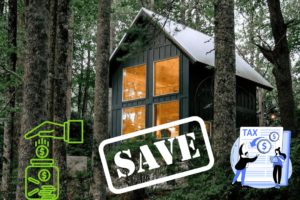Unveiling the Financial Perks of Tiny House Living
Tiny houses have emerged as a symbol of simplicity, sustainability, and an alternative to conventional homeownership. As more individuals opt for downsized living, they discover a hidden treasure trove of financial advantages associated with tiny houses.
In this article, we will delve into the world of tiny house living and explore the often-overlooked tax benefits that come with it. Whether considering a tiny house as your primary residence or an investment, understanding the potential tax advantages can be a game-changer for your financial well-being.
The Appeal of Tiny Houses
Tiny houses are more than just compact spaces; they are symbols of a profound shift towards a simpler, more intentional way of life. Let’s delve deeper into the various aspects that make tiny houses appealing to a diverse range of people:
- Affordability: Tiny houses are often significantly more affordable than traditional homes. The lower upfront cost makes homeownership more accessible to a broader demographic, including young adults, retirees, and those looking to escape the burden of a large mortgage. It also enables individuals to allocate their financial resources to other life goals, such as travel or investments.
- Minimalist Lifestyle: The minimalist lifestyle that tiny houses promote can be a refreshing change for many. Downsizing to a smaller space forces people to declutter and prioritize what truly matters. This simplification of material possessions can reduce stress, increase happiness, and have a clearer focus on experiences and relationships.
- Sustainability: Tiny houses are often designed with sustainability in mind. They use fewer resources in construction, require less energy to heat and cool, and have a smaller carbon footprint overall. Sustainable features like solar panels, rainwater harvesting systems, and composting toilets are commonly integrated into tiny house designs, appealing to eco-conscious individuals.
- Mobility and Flexibility: Tiny houses on wheels, known as “tiny houses on wheels” (THOWs), offer a unique level of mobility. For those with a sense of wanderlust or those who desire flexibility in where they live, THOWs allow for easy relocation. This can attract remote workers, digital nomads, or retirees looking to explore different regions.
- Customization: Tiny houses offer a high degree of customization. Homeowners can design their tiny homes to meet their specific needs and preferences. This level of personalization is a stark contrast to many cookie-cutter, mass-produced homes, allowing people to create spaces that reflect their personalities.
- Community Living: Some tiny house enthusiasts are drawn to the sense of community that often accompanies tiny house living. Tiny house villages or communities have sprung up in various places where like-minded individuals can share resources, reduce costs, and build strong social connections.
- Financial Freedom: Living in a tiny house can lead to significant cost savings in terms of lower mortgage or rent payments and reduced utility bills and maintenance costs. This financial freedom can free up resources for pursuing passions, early retirement, or paying off debt.
- Energy Efficiency: Tiny houses are typically designed with energy efficiency in mind. They are easier to heat and cool, often using less energy than larger homes. This efficiency translates to lower monthly energy bills and a reduced environmental impact.
- Creative Design Opportunities: The limited space of a tiny house challenges architects and homeowners to think creatively. This often leads to innovative space-saving solutions, multi-purpose furniture, and unique interior designs that inspire creativity and adaptability.
- Escape from Urban Life: Many people are drawn to tiny houses to escape the fast-paced, urban lifestyle. They provide an opportunity to live closer to nature in serene and secluded locations, whether in the woods, by a lake, or in the mountains.
- Self-Sufficiency: Tiny house living encourages self-sufficiency and a more hands-on approach to life. Homeowners often become more resourceful, learning valuable skills like gardening, woodworking, and off-grid living.
- Reduced Environmental Impact: Tiny houses have a smaller environmental footprint, especially those designed with sustainability. For individuals passionate about environmental conservation, this aligns with their values and helps reduce their contribution to climate change.
In summary, the appeal of tiny houses extends far beyond their size. They represent an opportunity to live a more affordable, sustainable, and fulfilling life while encouraging a shift away from excessive consumption and a deeper connection with one’s surroundings and community. These factors collectively make tiny houses attractive to a wide range of people seeking alternative and meaningful ways of living.
Tax Benefits: Uncovering the Hidden Savings
As we embark on this journey, we invite you to explore the often-overlooked tax benefits of residing in a tiny house. These financial advantages extend well beyond the confines of minimalistic living, promising a world of potential savings and incentives for those who dare to embrace this unique housing lifestyle. Let’s dive deeper into the various tax benefits associated with living in a tiny house, helping you uncover the hidden savings:
1. Property Taxes:
● Lower Assessments: Tiny houses are typically assessed at a lower value than larger homes due to their reduced square footage. As a result, property taxes are often significantly lower. This can translate into substantial annual savings, especially in high property tax rates.
● Mobility Advantages: If your tiny house is on wheels, it might be considered a movable asset rather than a permanent structure, leading to even lower property tax assessments in some cases.
● Homestead Exemptions: In some regions, homestead exemptions are available for primary residences, further reducing property taxes. Tiny houses can qualify for these exemptions if they meet certain criteria.
2. Environmental Credits:
● Green Building Credits: Tiny houses, particularly those designed with eco-friendly materials and features, may qualify for green building tax credits or incentives offered by federal or state governments. These credits reward environmentally conscious housing choices.
● Energy Efficiency Rebates: Installing energy-efficient appliances, insulation, and renewable energy systems in your tiny house can make you eligible for energy efficiency rebates or tax credits, reducing your overall tax liability.
3. Affordable Housing Programs:
● Federal Grants and Subsidies: Some government programs aim to promote affordable housing options, and tiny houses can qualify for these initiatives. These programs can include grants, low-interest loans, or tax incentives to make housing more affordable for individuals and families.
● Local Initiatives: Many municipalities offer incentives for tiny house construction within their jurisdictions, including reduced permitting fees, property tax reductions, or even land lease agreements at lower rates.
4. Home Office Deductions:
● Business Expenses: If you use your tiny house as a dedicated home office space for a business, you may be eligible for deductions related to the space’s proportionate share of your overall housing expenses. This can include deductions for utilities, maintenance, and even a portion of your mortgage or rent.
● Depreciation: Homeowners using their tiny houses as home offices can also consider depreciation deductions, which allow you to recover the cost of your tiny house over time.
5. Investment Considerations:
● Capital Gains Tax Exemptions: If you decide to sell your tiny house, you may be eligible for capital gains tax exemptions if it qualifies as your primary residence. These exemptions can help you keep more of your profits from the sale.
● Property Tax Deductions: Depending on your location, you can deduct a portion of your property taxes as an expense if you use your tiny house as a rental property.
6. Legal Compliance:
● Staying Informed: Understanding the tax laws and regulations associated with tiny house living is crucial to ensure you comply. Staying informed can help you avoid potential tax-related issues in the future.
7. Location Matters: Local Tax Regulations:
● Local Tax Incentives: Investigate whether your local government offers specific tax incentives for tiny house living. These can vary widely by region and can significantly impact your overall savings.
8. Real-Life Examples:
● Case Studies: Real-life examples of individuals who have reaped tax benefits from their tiny houses can provide valuable insights and inspiration for maximizing your savings potential.
By exploring and taking advantage of these tax benefits, tiny house dwellers can enjoy significant financial savings, further enhancing the appeal of living in a small, sustainable home. These savings can be channeled towards other life goals, investments, or simply enhancing the quality of life within the tiny house.
Location Matters: Local Tax Regulations
One critical aspect to understand when exploring the tax benefits of living in a tiny house is that these advantages can vary significantly based on location. Local tax codes and regulations play a pivotal role in determining the extent of the benefits you might receive. Here’s why you should pay close attention to your specific region:
- Diverse Tax Laws: Tax laws and regulations are not uniform across all regions. What may be a tax advantage in one state or municipality could be different elsewhere. This variation can greatly influence the financial benefits of tiny house living.
- Property Tax Assessment: Property tax assessment methodologies differ by locality. Some areas assess property taxes based on the assessed value of the land and improvements, while others use square footage, market value, or other criteria. The way your tiny house is assessed can impact your tax liability.
- Zoning and Building Codes: Zoning laws and building codes can vary significantly, affecting the legality and taxation of tiny houses. In some areas, tiny houses may be classified as accessory dwelling units (ADUs) or recreational vehicles, each with its own set of tax implications.
- Exemptions and Credits: Local governments may offer unique property tax exemptions, credits, or rebates specific to tiny houses or small dwellings. These incentives can significantly reduce your property tax burden but are often location-dependent.
- Use and Occupancy Regulations: Some municipalities have specific rules regarding how tiny houses can be used and occupied. Understanding these regulations is essential to ensure you comply with local laws and regulations, which can impact your tax status.
Research Your Local Tax Codes and Regulations
Given the nuanced and location-dependent nature of tax benefits associated with tiny house living, conducting thorough research into your local tax codes and regulations is crucial. Here’s how you can get started:
- Contact Local Authorities: Contact your local municipal or county government offices to inquire about tiny house regulations and tax incentives. They can provide valuable information specific to your area.
- Consult a Tax Professional: A tax professional or accountant familiar with local tax laws can help you navigate the complexities of tiny house taxation in your region. They can offer expert advice tailored to your situation.
- Join Local Tiny House Communities: Connect with local tiny house communities or online forums where members often share their experiences and insights regarding taxes and regulations in your area. They can offer practical advice based on their own experiences.
- Review Official Documents: Examine official documents such as zoning codes, building ordinances, and tax guidelines available from your local government. These documents often contain crucial information about how tiny houses are treated in your jurisdiction.
While the tax benefits of living in a tiny house are enticing, understanding your specific location’s unique tax landscape is paramount. Take the time to research and consult with local authorities or professionals to ensure you maximize the financial advantages while staying compliant with local laws and regulations. By doing so, you can make informed decisions and fully enjoy the financial perks that tiny house living can offer in your area.
Financial Planning and Tiny House Living
Integrating tax advantages into your long-term financial planning is a smart move for anyone considering tiny house living. You can make informed decisions that align with your financial goals by factoring in potential savings and benefits.
Conclusion
Tiny house living offers far more than just a minimalistic lifestyle. It offers financial advantages, from lower property taxes to eco-friendly credits and investment opportunities.
While the allure of simplicity is undeniable, the potential for financial stability and savings is an equally compelling reason to explore the world of tiny houses. So, whether you’re downsizing, investing, or just curious, remember that the benefits of tiny house living extend beyond its compact walls.




